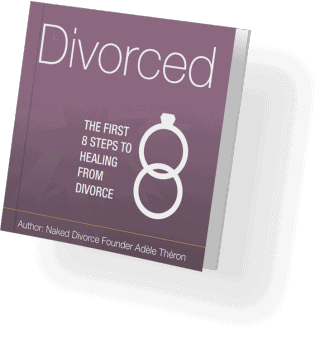
Free e-book: The First 8 Steps to healing from divorce
Regret for a Marriage in Crisis: Navigating Through the Storm

As a certified trauma coach with a speciality in marriage and divorce, I’ve had the privilege of guiding many couples through the turbulent waters of a relationship in crisis, as well as helping them through the divorce process.
One thing that is common in every relationship that gets brought to me is that one or both partners experience deep feelings of regret when a marriage reaches a breaking point. This regret can be overwhelming and may stem from a variety of reasons—lost opportunities, hurtful words, or unfulfilled expectations. The fear of regret often informs whether a person stays or leaves a relationship.
We All Wish We Had a Crystal Ball
The what-ifs in a relationship on the brink can be debilitating. Everyone wishes that they could see into the future. To see whether they will be happier if they leave, if the marriage actually works out in the end, whether their relationship will be filled with bitterness and contempt, or if leaving their spouse just creates an unfulfilled future.
The regret pertains to the costs of taking action versus just staying as is. The consequences of staying or leaving loom large and can cause substantial emotional distress. Not knowing whether taking action will change the marriage for the better or change life for the worse is complicated and going over and over how we picture our futures doesn’t always help.
The Land of Negative Sentiment Override
Marital problems left untended develop into something untenable. Situations that once could have been healed with a hug and kind words now blow out of proportion. Healing and conflict resolution starts to feel impossible, complicated and ineffective. We begin to believe that our marriage is not saveable and it’s better to part ways.
This is what John Gottman refers to as negative sentiment override (NSO). This happens when we begin to view our relationship through negative eyes. Everything feels tainted, and we view our partners and our relationship history without any warmth. It’s characterized by a loss of hope, and fond memories are cruelly twisted into ones lacking any happiness.
NSO is a by-product of missed micro-opportunities for connection. It’s the moments where we turn away from our partner’s bids for affection; it’s forgetting to do what you’ve been asked to a million times; it’s dismissing the hopeless look on our partner’s face again and again.
In most cases, we have had a creeping sense of trouble for some time, but we’ve largely ignored it until the moment when we can’t anymore. Many sense the rising waters but dismiss them as harmless due to the rate at which they are rising, and by the time they try to rescue themselves or their partner, they are submerged and drowning.
If you find yourself at this junction, then it’s highly likely that you are considering taking very urgent and forceful action. Your finger is edging ever closer to the big divorce button. But for some reason, you stay.
Now, the really interesting thing is whether you stay because you believe that you can’t be disappointed if you don’t have hope or expectations, so you squash your dreams and stay. Or is it because you secretly hope that it will get better?
Do We Have Too Many Choices?
Our lives today are brimming with choices. We can have whatever we want at our doorstep with the simple click of a button; a plethora of dating sites have our perfect match waiting for us, and social media connects us with people we otherwise would never have known. While we tend to cherish having these options, they can come at a cost.
Researchers Roese and Summerville (2005), authors of What We Regret Most—and Why, coined the phrase “Opportunity Principle.” They found that people’s feelings of dissatisfaction are most significant when they believe they could have taken a different path but didn’t. The mere belief that we have few options leads to playing it safe and maintaining the status quo; we are more likely to stay in a relationship and work up the courage to seek help and improve the relationship when we have fewer choices.
However, in a world where a new partner is just one click away and at the other end of a dating app, this courage is becoming exceedingly hard to come by.
The opportunity principle, at its essence, shows that people who are in an unhappy relationship are sometimes stuck in a rock and a hard place. By believing they are worthy and lovable they are spurred into action, encouraging their partners to do the work needed to save the relationship. On the other hand, this belief, along with a plethora of choices, could present a distorted opportunity that there is an abundance of better things out there, which could leave to a premature exit to the relationship.
Can Picturing Our Future Selves Help to Avoid Regret?
Unfortunately, there is no crystal ball to help us to determine the best course of action. We can’t predict which decision will bring the least regret. Perhaps the best thing we can do is create a list of the unknowns about the future and imagine ourselves in different scenarios at 75 or so. Would you be happy with your relationship as it is now at 75? Would you be happy with having lived with this relationship throughout those years? Imagine you did nothing and stayed, then you took action and left. Which scenario plays out better in your mind? Where do the gains outweigh the costs?
Notice how each scenario makes you feel, what it would mean to put the work into your relationship, or what it would look like to let the relationship go.
Our relationships are the most critical aspects of our lives, and we will undoubtedly have some regrets along the way. The most important thing is that we have chosen to live with courage, love, and kindness wherever we can.
Contact us at Naked Divorce if you need guidance in your marriage.

